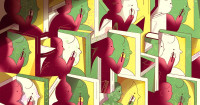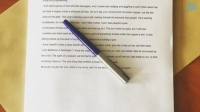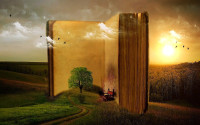
My First Thriller: Joseph Finder
crimereads.com – Thursday November 16, 2023

Joe Finder must have thought he knew the secrets to selling a book. His first, a work of nonfiction, Red Carpet: The Connection Between the Kremlin and America’s Most Powerful Businessmen, had a hardcover run of 10,000.
It sold out.
Sounds like an early and smooth ride into the literary sunset. But there’s a catch. (There’s always something in book publishing.)
Finder, a Harvard graduate student in Russian Studies at the time, managed to anger one of the richest and most powerful men in America while writing Red Carpet. The man was so mad he approached Finder’s academic advisor with a proposal: kick Finder out of school and he’d write Harvard a check so big they’d have to use a wheelbarrow to deliver it. He also tempted the university with a trove of personal papers for its archives.

Big Publishing Killed the Author
newrepublic.com – Wednesday November 15, 2023

The suggestion that Beloved, Toni Morrison’s acclaimed novel about slavery and its afterlives, is also a parable about the publishing industry would be bizarre, even offensive—if, that is, Morrison herself hadn’t explicitly suggested it. For years, Morrison had felt not merely penned in by her career as an editor at the publishing giant Random House; she had felt indentured, “held in contempt—to be played with when our masters are pleased, to be dismissed when they are not,” as she declared in a speech six years before publishing Beloved. Upon leaving her job at Random House to focus on writing full-time, she felt “free in a way I had never been, ever.… Enter Beloved.” It was, she continued in the novel’s preface, “the shock of liberation”—liberation from the world of corporate publishing—“that drew my thoughts to what ‘free’ could mean.” In the novel itself, Morrison has Baby Suggs, the protagonist’s mother, describe freedom from slavery in strikingly similar terms.

How To Write A Query Letter That Makes Literary Agents Take Notice
livinggossip.com – Tuesday November 14, 2023

Writing a query letter is a crucial step in the journey of getting your manuscript published. Literary agents receive countless submissions daily, and your query letter is your first chance to make a lasting impression. To ensure that your work gets the attention it deserves, you need to craft a compelling query letter that stands out from the rest. In this guide, we will provide you with a step-by-step process on how to write a query letter that literary agents will find irresistible. Let’s get started!

How to Become a Short Storyist
By G. Miki Hayden
Instructor at Writer's Digest University online and private writing coach
firstwriter.com – Tuesday November 14, 2023

I wanted to become a novelist, but a friend of mine gave me a tip: “Write short stories as credentials you can mention in query letters for your novels.” I decided to follow her advice, plus I could write a short story in a couple of weeks for some quick satisfaction.
Since then, I’ve written and published generous handfuls of short stories, won a couple of short story awards, and made a little money at the game—mostly very little—but all coinage counts.
I want to herein present some revelations as to “how I do it.” But in addition to my having short stories published many times, I also have many worthy pieces not yet published, so don’t follow me there.
I don’t concentrate on just one element in the story when I write and then layer in other aspects—though you can do that. I also rarely restructure. I write and then polish. However, while I certainly think that writing everything at the same time produces a more cohesive piece, I also will suggest that my students (at Writers Digest’s Writers Online Workshops) can deposit in elements later on if they aren’t able to provide them in the initial draft.
The most common essentials that students will miss in their short story writing are emotion, setting, and point-of-view character internals.
The eliciting of emotion is definitely an important fundamental of fiction, but that’s probably the hardest thing for writers to do. So I don’t really mean that exactly, as creating suspense, tension, the onset of romance, or even reader sorrow is extremely difficult. If writers can actually trigger reader feelings—wonderful—they may make a lot of money selling their manuscripts. But if they can’t, then they can at least include the mechanical representation of these sensations. We are always able to write “His heart thudded in his chest, and he thought he would faint.” That will substitute for the real thing in many instances, and a writer does need to have at least elements of emotion to round out any story.

Faber chair Page says he is 'confident' publishers will adapt to AI
thebookseller.com – Tuesday November 14, 2023

Stephen Page, Faber and Faber chair, has said that he is "confident" publishers will find their way with AI, adding that "technology usually amplifies publishing".
In a public lecture delivered at the University of West London on Thursday 9th November, Page reflected on the "five revolutions" that publishing has undergone over recent decades and how the book trade can rise to future challenges instead of being "swept up" in them. He said that human, intellectual, social and financial capital are "at the heart of what has made publishing endure" and will be essential in future challenges like AI.
"Publishing is innately revolutionary in its makeup," Page said. "It takes the ideas that will change society [and] makes them public through putting them into the world."

What's the Future of Books?
esquire.com – Thursday November 9, 2023

The publishing industry is in flux. One major publisher has been acquired by a private equity firm, editors are departing (and getting laid off) from others, there are fewer book media outlets than ever, and most literary discourse is happening online. But what does it all mean for the books themselves, and the ways that readers are discovering them? Here, we make some predictions about the future of books.
“Celebrities and tastemakers are becoming the new medium for discovery,” says Ariele Fredman, a literary agent at United Talent Agency who previously launched eight #1 New York Times bestsellers as a publicist. As a result, it will be more important than ever for debut novels to land on book club rosters.
A Reese Witherspoon, Oprah, or Jenna Bush endorsement can be enough to not only secure a spot on the bestseller list, but anoint an author with a fanbase that lasts. “If you don't get one of those coveted spots, it becomes even harder to break a new voice,” Fredman adds.
Outside of those chosen debuts, “we're going to see a continued investment in bigger-name authors” from publishers, says former editor Molly McGhee, the author of Jonathan Abernathy You Are Kind, “because they have guaranteed returns on investment.”

Has It Ever Been Harder to Make a Living As An Author?
esquire.com – Wednesday November 8, 2023

In early August, after Andrew Lipstein published The Vegan, his sophomore novel, a handful of loved ones asked if he planned to quit his day job in product design at a large financial technology company. Despite having published two books with the prestigious literary imprint Farrar, Straus, and Giroux, Lipstein didn’t have any plans to quit; he considers product design to be his “career,” and he wouldn’t be able to support his growing family exclusively on the income from writing novels. “I feel disappointed having to tell people that because it sort of seems like a mark of success,” he said. “If I’m not just supporting myself by writing, to those who don't know the reality of it, it seems like it's a failure in some way.”
The myth of The Writer looms large in our cultural consciousness. When most readers picture an author, they imagine an astigmatic, scholarly type who wakes at the crack of dawn in a monastic, book-filled, shockingly affordable house surrounded by nature. The Writer makes coffee and sits down at their special writing desk for their ritualized morning pages. They break for lunch—or perhaps a morning constitution—during which they have an aha! moment about a troublesome plot point. Such a lifestyle aesthetic is “something we’ve long wanted to believe,” said Paul Bogaards, the veteran book publicist who has worked with the likes of Joan Didion, Donna Tartt, and Robert Caro. “For a very small subset of writers, this has been true. And it’s getting harder and harder to do.”

From Dream to Draft: Transform Your Ideas with Creative Writing Courses
fleepbleep.com – Friday November 3, 2023

Are you an aspiring writer with a head full of stories waiting to be told? Do you have a burning desire to share your thoughts, emotions, and imagination with the world? If so, you’re not alone. Many dream of becoming writers but struggle to turn their ideas into fully-fledged drafts. The good news is that there’s a path from dream to draft, and it often begins with creative writing courses.
In this article, we’ll explore the transformative power of creative writing courses, how they can help you unlock your creativity, hone your skills, and ultimately bring your writing dreams to life. Whether you’re a complete novice or an experienced writer looking to refine your craft, read on to discover how these courses can be your guiding light on the journey from dream to draft.

The Ultimate Guide to Finding a Literary Agent for Your Book
legaldesire.com – Thursday November 2, 2023

If you’re an aspiring author who dreams of publishing your book by a traditional publishing house, securing a literary agent is essential. A literary agent acts as a professional representative, connecting authors with publishers. Their industry connections, expertise, and experience are instrumental in selling your manuscript to the right publisher, negotiating favorable deals, and safeguarding your rights.
However, finding the ideal literary agent who is genuinely interested in your book and can secure the best deal can be daunting. Standing out from many aspiring authors and avoiding scams and pitfalls are common concerns.
In this guide, we will address these questions and provide valuable insights on how to find a literary agent. Whether your book is fiction or nonfiction, Christian or secular, genre-specific or literary, we will offer the best tips and strategies to help you find and attract the perfect agent for your manuscript.

Example Of A Book Proposal That Should Have Been Accepted
financialsamurai.com – Tuesday October 24, 2023

So you want to publish the next great book! To do so you first need a book proposal.
Back in late 2011, I spent hours putting together a book proposal for my severance negotiation strategy book, How To Engineer Your Layoff.
After engineering my own layoff three months earlier, I had hoped to get a literary agent, land a book deal, and spend the next year writing the book. Writing a book was always on my bucket list. And what better time to do so than after retiring on a beach in Hawaii?
Alas, fate had other plans. I submitted my book proposal to about 15 agents and didn't get a single reply back. Undaunted, and with the help of my dad and wife, I decided to self-publish my book anyway.
Get the free newsletter | Submit a news item or article | Get Writers' News for your website





